|
|
|
Sort Order |
|
|
|
Items / Page
|
|
|
|
|
|
|
| Srl | Item |
| 1 |
ID:
098264
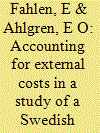

|
|
|
|
|
| Publication |
2010.
|
| Summary/Abstract |
Sweden has historically had strict emission control by implementation of economic policy instruments with the aim of internalising the external costs of air pollution. This study aims to evaluate how well current Swedish policy instruments reflect the environmental costs associated with heat generation in several district-heating (DH) plants in the DH system of Göteborg. Furthermore, it aims to simulate and evaluate the operation of the DH system based on its social cost-effectiveness which takes into account the DH system's private and external costs (non-internalised environmental costs). The study shows that the economic policy instruments do not fully internalise all external costs whereas for certain technologies, the costs in terms of taxes, emission permits, environmental fees, etc. are higher than the environmental costs caused by the pollutants, given the environmental cost estimates used in the study. The simulation results show that the deviating internalisation of external costs affects the economic ranking of the different plants within the studied DH system. The estimated loss in social-cost effectiveness of the operation of the DH system of Göteborg is noticable but relatively small if compared to the variable heat generation costs for most of the studied DH plants.
|
|
|
|
|
|
|
|
|
|
|
|
|
|
|
|
| 2 |
ID:
098560
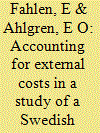

|
|
|
|
|
| Publication |
2010.
|
| Summary/Abstract |
Sweden has historically had strict emission control by implementation of economic policy instruments with the aim of internalising the external costs of air pollution. This study aims to evaluate how well current Swedish policy instruments reflect the environmental costs associated with heat generation in several district-heating (DH) plants in the DH system of Göteborg. Furthermore, it aims to simulate and evaluate the operation of the DH system based on its social cost-effectiveness which takes into account the DH system's private and external costs (non-internalised environmental costs). The study shows that the economic policy instruments do not fully internalise all external costs whereas for certain technologies, the costs in terms of taxes, emission permits, environmental fees, etc. are higher than the environmental costs caused by the pollutants, given the environmental cost estimates used in the study. The simulation results show that the deviating internalisation of external costs affects the economic ranking of the different plants within the studied DH system. The estimated loss in social-cost effectiveness of the operation of the DH system of Göteborg is noticable but relatively small if compared to the variable heat generation costs for most of the studied DH plants.
|
|
|
|
|
|
|
|
|
|
|
|
|
|
|
|
| 3 |
ID:
098576
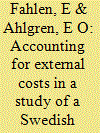

|
|
|
|
|
| Publication |
2010.
|
| Summary/Abstract |
Sweden has historically had strict emission control by implementation of economic policy instruments with the aim of internalising the external costs of air pollution. This study aims to evaluate how well current Swedish policy instruments reflect the environmental costs associated with heat generation in several district-heating (DH) plants in the DH system of Göteborg. Furthermore, it aims to simulate and evaluate the operation of the DH system based on its social cost-effectiveness which takes into account the DH system's private and external costs (non-internalised environmental costs). The study shows that the economic policy instruments do not fully internalise all external costs whereas for certain technologies, the costs in terms of taxes, emission permits, environmental fees, etc. are higher than the environmental costs caused by the pollutants, given the environmental cost estimates used in the study. The simulation results show that the deviating internalisation of external costs affects the economic ranking of the different plants within the studied DH system. The estimated loss in social-cost effectiveness of the operation of the DH system of Göteborg is noticable but relatively small if compared to the variable heat generation costs for most of the studied DH plants.
|
|
|
|
|
|
|
|
|
|
|
|
|
|
|
|
| 4 |
ID:
066678
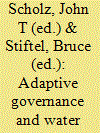

|
|
|
|
|
| Publication |
Washington, Resources for the future, 2005.
|
| Description |
xii, 274p.
|
| Standard Number |
193311519x
|
|
|
|
|
|
|
|
|
|
|
|
Copies: C:1/I:0,R:0,Q:0
Circulation
| Accession# | Call# | Current Location | Status | Policy | Location |
| 050369 | 333.7/SCH 050369 | Main | On Shelf | General | |
|
|
|
|
| 5 |
ID:
169747
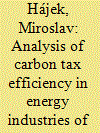

|
|
|
|
|
| Summary/Abstract |
A carbon tax is one of economic policy instruments of environmental protection supposed to contribute to the reduction of greenhouse gas (GHG) emissions. A functional carbon tax aims at incorporating costs for elimination of environmental harm into the pricing decisions. In terms of global climate change, the carbon tax is usually imposed on the production, distribution or consumption of carbon-content fossil fuels. The main aim of the study is to evaluate the carbon tax environmental effectiveness in the energy industries of selected EU countries, namely Sweden, Finland, Denmark, Ireland and Slovenia. To achieve the principal research objective, the multiple panel regression method for the selected variables was used, the synergy of other environmental policy tools being taken into account. Control variables employed were emission allowance price, household final consumption expenditure, corporate investments, solid fuel consumption and renewable energy consumption. The analysis results suggest that the carbon tax in the energy industry is environmentally efficient, an increased tax rate allowing to reduce GHG production, which is statistically significantly affected by the consumption of fossil fuels. Based on the estimated partial regression coefficient (−0.01158), raising the carbon tax by one euro per tonne can cut annual per capita emissions by 11.58 kg.
|
|
|
|
|
|
|
|
|
|
|
|
|
|
|
|
| 6 |
ID:
183578
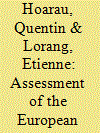

|
|
|
|
|
| Summary/Abstract |
This paper investigates the design of a recent regulatory proposal aimed at favoring the emergence of a battery recycling industry in Europe. Electric mobility is deemed necessary to cut CO2 emissions in the transport sector but the industrial and environmental impacts of lithium-ion battery manufacturing are controversial. A recent regulatory proposal from the European Commission introduces the obligation to attain a series of minimum thresholds of recycled materials for the new batteries to be manufactured after 2030. This paper discusses the conditions required for that obligation to be fulfilled. It develops a material flow model that projects battery wastes and their recycling potential. Our findings indicate that the feasibility of proposed thresholds is not very sensitive to changes of material intensities from battery technology shifts, recycling efficiencies, or the faster uptake of demand. On the contrary, battery lifetimes are the most crucial parameters for recycling potential. We believe that this result could jeopardize avenues for extending battery lifetimes such as second-life battery usage. Our policy recommendations are twofold. First, we recommend lower thresholds to improve the regulation credibility. Second, the regulation should integrate other objectives that address the lifetime of batteries.
|
|
|
|
|
|
|
|
|
|
|
|
|
|
|
|
| 7 |
ID:
125691
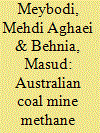

|
|
|
|
|
| Publication |
2013.
|
| Summary/Abstract |
Methane, a major contributor to global warming, is a greenhouse gas emitted from coal mines. Abundance of coal mines and consequently a considerable amount of methane emission requires drastic measures to mitigate harmful effects of coal mining on the environment. One of the commonly adopted methods is to use emitted methane to fuel power generation systems; however, instability of fuel sources hinders the development of systems using conventional prime movers. To address this, application of Stirling engines may be considered.
Here, we develop a techno-economic methodology for conducting an optimisation-based feasibility study on the application of Stirling engines as the prime movers of coal mine CHP systems from an economic and an environmental point of view. To examine the impact of environmental policies on the economics of the system, the two commonly implemented ones (i.e. a carbon tax and emissions trading scheme) are considered. The methodology was applied to a local coal mine. The results indicate that incorporating the modelled system not only leads to a substantial reduction in greenhouse gas emissions, but also to improved economics. Further, due to the heavy economic burden, the carbon tax scheme creates great incentive for coal mine industry to address the methane emissions.
|
|
|
|
|
|
|
|
|
|
|
|
|
|
|
|
| 8 |
ID:
132949
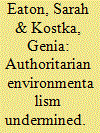

|
|
|
|
|
| Publication |
2014.
|
| Summary/Abstract |
China's national leaders see restructuring and diversification away from resource-based, energy intensive industries as central goals in the coming years. On the basis of extensive fieldwork in China between 2010 and 2012, we suggest that the high turnover of leading cadres at the local level may hinder state-led greening growth initiatives. Frequent cadre turnover is intended primarily to keep local Party secretaries and mayors on the move in order to promote the implementation of central directives. While rotation does seem to aid implementation by reducing coordination problems, there are also significant downsides to local leaders changing office every three to four years. Officials with short time horizons are likely to choose the path of least resistance in selecting quick, low-quality approaches to the implementation of environmental policies. We conclude that the perverse effects of local officials' short time horizons give reason to doubt the more optimistic claims about the advantages of China's model of environmental authoritarianism.
|
|
|
|
|
|
|
|
|
|
|
|
|
|
|
|
| 9 |
ID:
120111
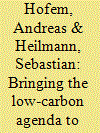

|
|
|
|
|
| Publication |
2013.
|
| Summary/Abstract |
This study traces the transnational interactions that contributed to introducing the low-carbon economy agenda into Chinese policymaking. A microprocessual two-level analysis (outside-in as well as inside-access) is employed to analyse transnational and domestic exchanges. The study provides evidence that low-carbon agenda-setting - introduced by transnational actors, backed by foreign funding, promoted by policy entrepreneurs from domestic research institutes, propelled by top-level attention, but only gradually and cautiously adopted by the government bureaucracy - can be considered a case of effective transnational diffusion based on converging perceptions of novel policy challenges and options. Opinion leaders and policy-brokers from the government-linked scientific community functioned as effective access points to the Chinese government's policy agenda.
|
|
|
|
|
|
|
|
|
|
|
|
|
|
|
|
| 10 |
ID:
118445
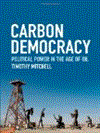

|
|
|
|
|
| Publication |
London, VERSO, 2011.
|
| Description |
ix,278p.hbk
|
| Standard Number |
9781844677450
|
|
|
|
|
|
|
|
|
|
|
|
Copies: C:1/I:0,R:0,Q:0
Circulation
| Accession# | Call# | Current Location | Status | Policy | Location |
| 057082 | 320.011/MIT 057082 | Main | On Shelf | General | |
|
|
|
|
| 11 |
ID:
132768
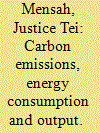

|
|
|
|
|
| Publication |
2014.
|
| Summary/Abstract |
Following the recent global economic downturn, attention has gradually shifted towards emerging economies which have experienced robust growth amidst sluggish growth of the world economy. A significant number of these emerging economies are in Africa. Rising growth in these economies is associated with surging demand for energy to propel the engines of growth, with direct implications on emissions into the atmosphere. Further, these economies are constantly being shaped by series of structural reforms with direct and indirect effects on growth, demand for energy, etc. To this end, this paper examines the causal dynamics among energy use, real GDP and CO2 emissions in the presence of regime shifts in six emerging African economies using the Gregory and Hansen (1996a). J. Econ. 70, 99-126 threshold cointegration and the Toda and Yamamoto (1995). J. Econometrics. 66, 225-250 Granger causality techniques. Results confirm the presence of regime shift effects in the long run inter-linkages among energy use, real GDP and CO2 emissions in the countries considered, thus indicating that structural changes have both economic and environmental effects. Hence, integration of energy and environmental policies into development plans is imperative towards attaining sustainable growth and development.
|
|
|
|
|
|
|
|
|
|
|
|
|
|
|
|
| 12 |
ID:
081005
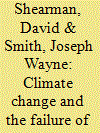

|
|
|
|
|
| Publication |
Westport, Praeger, 2007.
|
| Description |
xix, 181p.
|
| Series |
Politics and the envioronment
|
| Standard Number |
9780313345043
|
|
|
|
|
|
|
|
|
|
|
|
Copies: C:1/I:0,R:0,Q:0
Circulation
| Accession# | Call# | Current Location | Status | Policy | Location |
| 053156 | 363.73874561/SHE 053156 | Main | On Shelf | General | |
|
|
|
|
| 13 |
ID:
065047


|
|
|
|
|
| Publication |
London, Allaen Lane, 2005.
|
| Description |
ix, 575p.
|
| Standard Number |
0713992867
|
|
|
|
|
|
|
|
|
|
|
|
Copies: C:1/I:0,R:0,Q:0
Circulation
| Accession# | Call# | Current Location | Status | Policy | Location |
| 049970 | 304.28/DIA 049970 | Main | On Shelf | General | |
|
|
|
|
| 14 |
ID:
083313


|
|
|
|
|
| Publication |
London, Routledge, 2008.
|
| Description |
xiv, 278p.
|
| Series |
Routledge/RIPE studies in global political economy
|
| Standard Number |
9780415455138
|
|
|
|
|
|
|
|
|
|
|
|
Copies: C:1/I:0,R:0,Q:0
Circulation
| Accession# | Call# | Current Location | Status | Policy | Location |
| 053859 | 363.70561/BRA 053859 | Main | On Shelf | General | |
|
|
|
|
| 15 |
ID:
149934


|
|
|
|
|
| Summary/Abstract |
In European countries, retailers are obliged to disclose the energy source and the related environmental impacts of their portfolio over the preceding year. The electricity supplied in the Dutch retail market is presented as renewable energy for 34%, but this relatively high share is for 69% based on certificates (Guarantees of Origin) which are imported from in particular Norway. The certificates are used to sell green electricity to consumers. The premium for green electricity which is actually paid by Dutch consumers is no more than a few percentages of the retail price. The low level of this premium is related to the abundant supply of certificates at low marginal costs from Norway. This also means that the premium for green electricity is too low to give an incentive for investments in new capacity. Hence, the current labelling system for renewable electricity is mainly valuable, besides being an instrument for tracking and tracing of renewable energy, as a marketing instrument for electricity retailers. The effectiveness of Guarantees of Origin as a policy instrument to foster renewable electricity sources is weak. This effectiveness can be raised by implementing restrictions on the international trade or the issuance of new certificates.
|
|
|
|
|
|
|
|
|
|
|
|
|
|
|
|
| 16 |
ID:
034130
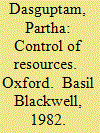

|
|
|
|
|
| Publication |
Oxford, Basil Blackwell, 1982.
|
| Description |
ix, 223p
|
| Standard Number |
0631129359
|
|
|
|
|
|
|
|
|
|
|
|
Copies: C:1/I:0,R:0,Q:0
Circulation
| Accession# | Call# | Current Location | Status | Policy | Location |
| 021097 | 333.7/DAS 021097 | Main | On Shelf | General | |
|
|
|
|
| 17 |
ID:
162619
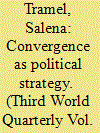

|
|
|
|
|
| Summary/Abstract |
Critical scholars and activists have now been contending with a widely recognised convergence of global crises for a decade. The issues have intersected decisively, with staple food sources proving inaccessible for the world’s poor, banks foreclosing on the most vulnerable, fuel sources causing war and impacting migration, and climate change-related instabilities shaking low-income communities to their core. At the same time, agrarian, environmental, indigenous and fishers’ movements – among others – have used this moment to converge in their own right. This article explores this intertwining of social justice movements with an eye on such interrelated challenges. Its overall objective is, on one side, to provide some broad empirical brushstrokes on the intertwining of transnational social justice movements at the local, national and regional scales as they work with and trade frameworks of food sovereignty and climate justice. On the flip side, this article offers a set of tools to analyse and understand the politics of convergence as political strategy – as a means of advancing global social justice – against the rising tide of climate-related resource grabs.
|
|
|
|
|
|
|
|
|
|
|
|
|
|
|
|
| 18 |
ID:
171427


|
|
|
|
|
| Summary/Abstract |
Mitigation strategies towards progressive decarbonization of the energy system are a valid approach to slow environmental pollution yielding social benefits, as established from National Energy and Climate Plan (NECP). The first objective is the increase of energy efficiency within 2030 by promoting the use of renewable energy and the electrification of consumption in other sectors (household and transport). Cost-benefit analysis (CBA) is an analytical tool to evaluate investments and support policy decisions for society's welfare. The paper aims to assess how CBA can be used to quantify the costs and related social benefits in different sectors (energy, transport and household) if the decarbonization scenario is applied in Italy in 2030. Overall, our findings show positive benefits obtained with the adoption of different mitigation strategies for all sectors. These results can provide significant support to decision-makers in the implementation of decarbonization scenario in Italy scheduled for 2030.
|
|
|
|
|
|
|
|
|
|
|
|
|
|
|
|
| 19 |
ID:
162922
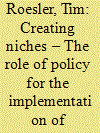

|
|
|
|
|
| Summary/Abstract |
Visions of alternative and more sustainable energy systems are commonly associated with the development and innovation of renewable energy technologies. Geels (2002) notes that regime transition is affected by a set of technological, socio-economic, organisational, political, institutional and region-specific dimensions that can be triggered by niche developments. Indeed, the transition toward a sustainable energy regime is strongly influenced by governance and regulatory frameworks extending from a global to a local scale, which set boundaries and incentives for the direction in which energy transition can evolve. Since 2007, several local initiatives have emerged in the county of Marburg-Biedenkopf in Germany promoting the use of biomass on a local scale. These initiatives successfully established locally owned cooperatives to run a decentralised heating supply infrastructure to supply their households. This paper highlights the role of multi-scalar policy processes that are allowing for the development of bioenergy villages and provides details on the role of regional and local policy processes. Supplementing the national policy framework with regional and local policy makers is a key factor in implementing bioenergy villages.
|
|
|
|
|
|
|
|
|
|
|
|
|
|
|
|
| 20 |
ID:
043329
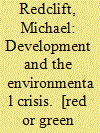

|
|
|
|
|
| Publication |
London, Methuen, 1984.
|
| Description |
viii, 149p.
|
| Standard Number |
0416321305
|
|
|
|
|
|
|
|
|
|
|
|
Copies: C:1/I:0,R:0,Q:0
Circulation
| Accession# | Call# | Current Location | Status | Policy | Location |
| 025121 | 337.72/RED 025121 | Main | On Shelf | General | |
|
|
|
|
|
|
|
|
|